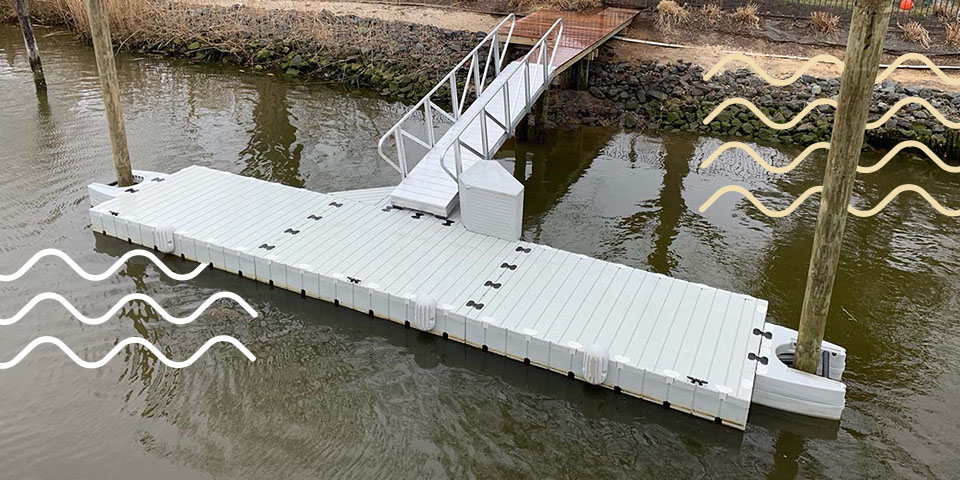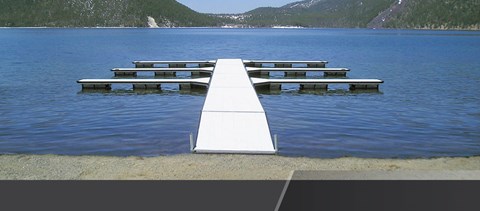Maximizing Your Outdoor Area with Specialized Floating Dock Solutions
Maximizing Your Outdoor Area with Specialized Floating Dock Solutions
Blog Article
Floating Docks: The Perfect Choice for Versatile Water Access
Floating docks present a compelling remedy for a selection of water access needs, supplying convenience that goes beyond conventional mooring options. The modular nature of floating docks promotes personalization, catering to details demands.
Benefits of Floating Docks
Floating docks deal numerous benefits that improve water access for different applications. Their capacity to climb and fall with transforming water levels makes them specifically advantageous in environments with changing tides or seasonal variants. This adaptability makes sure that vessels can easily anchor without issue for the water's deepness, providing a reputable platform for leisure, business, and commercial uses.
Furthermore, floating docks are frequently built from sturdy materials that resist rust, making them ideal for lasting use in aquatic atmospheres. Their installation is generally less invasive than conventional set docks, decreasing the environmental effect and promoting quicker deployment (floating dock services). This adaptability allows for simpler relocation or reconfiguration according to customer needs or environmental changes
Safety is another essential benefit; floating docks can offer steady access for individuals boarding or disembarking from watercrafts and minimize the danger of mishaps related to unstable surfaces. They can be designed to accommodate a selection of devices, such as cleats and fenders, enhancing capability. Overall, floating docks represent a reliable option for enhancing water access throughout diverse sectors while promoting safety and security and environmental sustainability.

Types of Floating Docks
Various kinds of floating docks cater to various requirements and atmospheres, each designed with certain attributes to enhance performance. One of the most usual types include modular docks, which include interlacing areas that permit very easy modification and development. These docks are perfect for recreational use, as they can be customized to fit numerous boat sizes and water conditions.
One more prominent choice is the fixed floating dock, which stays anchored in area yet drifts with transforming water levels. dock company. This type is particularly fit for areas with very little tidal changes, giving secure access for fishing or swimming. In addition, there are drive-on docks, which include a sloped layout that permits watercrafts to easily drive on and off, making them suitable for personal boat and smaller sized vessels
For business applications, sturdy floating docks are offered, built from strengthened materials to stand up to considerable tons and severe aquatic settings. Last but not least, eco-friendly floating docks use sustainable materials and designs to reduce environmental impact, frequently incorporating attributes like vegetation to support regional wild animals. Understanding the various sorts of floating docks makes sure that users can pick the most appropriate remedy for their certain demands.
Installation Refine Overview
An effective installation of floating docks calls for mindful preparation and attention to information to guarantee optimal efficiency and safety. The first step entails evaluating the site problems, including water deepness, current, and prospective obstacles. This evaluation educates the selection of the ideal dock products and style tailored to the certain setting.
Following, getting essential licenses is important, as many jurisdictions have laws relating to building and construction on water bodies. When approvals are secured, the setup can continue. Begin by preparing the foundation, which may entail anchoring systems or pilings customized to the dock type and regional problems.
Adhering to the structure setup, set up the dock areas according to manufacturer specifications. Make sure that all parts are firmly attached and straightened to endure advice environmental anxieties. Placement the dock in the marked location, guaranteeing it is level and secure.

Upkeep Tips and Ideal Practices
After the setup procedure is full, continuous maintenance plays an important role in making certain the long life and performance of floating docks. Routine evaluations should be performed to determine any indicators of wear, damages, or wear and tear - dock company. Examine for any loosened fittings, splits, or separation in the dock areas, as these can compromise architectural integrity
Cleaning the dock is necessary to get rid of debris, algae, and various other build-up that can impact its appearance and security. Use a mild stress laundry occasionally to maintain sanitation without causing damage to the surface. Furthermore, using a protective sealer every couple of years can help improve longevity and stand up to environmental wear.
Focus on the mooring lines and supports, ensuring they are cost-free and secure from rust. Change any type of abject components immediately to stay clear of hazards. Seasonal changes may likewise be essential; during extreme climate condition, enhancing the dock or repositioning can avoid damages.
Applications for Floating Docks
Floating docks offer a wide range of applications, catering to both recreational and industrial demands. In recreational settings, they provide seamless access to waterways for activities such as boating, fishing, and swimming. Their adjustable nature enables for setup in varying water degrees, making sure secure and steady accessibility no matter of tidal fluctuations.
Commercially, floating docks are indispensable for marinas and waterfront services. They promote the docking of vessels, making it possible for reliable discharging and packing of products. Their modular style enables easy expansion or reconfiguration to accommodate transforming company demands, making them perfect for boat rentals, tour procedures, or angling charters.
In addition, floating docks are utilized in environmental applications such as marine study and environment repair. They can work as platforms for clinical studies, keeping track of water quality, or performing wild animals surveys without disturbing delicate ecological communities.
In commercial contexts, floating docks are used in construction projects, giving accessibility to hard-to-reach areas for tools and workers. Their flexibility, sturdiness, and very little effect on the setting make them an ideal selection for a vast array of applications, boosting both official website performance and ease of access in various water-based settings.
Conclusion
Finally, floating docks represent an ideal solution for varied water access requires, owing to their adaptability, longevity, and modular style. These frameworks help with secure mooring for different applications while decreasing environmental effect throughout view publisher site setup. The lowered maintenance demands better improve their usefulness. Floating docks offer as a valuable property for recreational, business, and environmental tasks, guaranteeing reputable access to rivers and promoting sustainable methods in marine settings.
Floating docks existing an engaging option for a selection of water accessibility needs, providing flexibility that transcends traditional mooring options.Floating docks deal many advantages that improve water accessibility for numerous applications. On the whole, floating docks represent a reliable remedy for boosting water gain access to across diverse fields while advertising security and environmental sustainability.
Another preferred choice is the stationary floating dock, which remains anchored in area however floats with changing water degrees.In final thought, floating docks represent an optimal solution for varied water gain access to needs, owing to their flexibility, durability, and modular layout.
Report this page